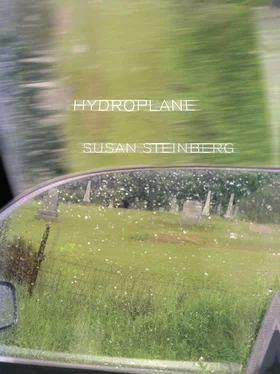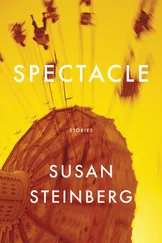Susan Steinberg - Hydroplane - Fictions
Здесь есть возможность читать онлайн «Susan Steinberg - Hydroplane - Fictions» весь текст электронной книги совершенно бесплатно (целиком полную версию без сокращений). В некоторых случаях можно слушать аудио, скачать через торрент в формате fb2 и присутствует краткое содержание. Год выпуска: 2006, Издательство: Fiction Collective 2, Жанр: Современная проза, на английском языке. Описание произведения, (предисловие) а так же отзывы посетителей доступны на портале библиотеки ЛибКат.
- Название:Hydroplane: Fictions
- Автор:
- Издательство:Fiction Collective 2
- Жанр:
- Год:2006
- ISBN:нет данных
- Рейтинг книги:4 / 5. Голосов: 1
-
Избранное:Добавить в избранное
- Отзывы:
-
Ваша оценка:
- 80
- 1
- 2
- 3
- 4
- 5
Hydroplane: Fictions: краткое содержание, описание и аннотация
Предлагаем к чтению аннотацию, описание, краткое содержание или предисловие (зависит от того, что написал сам автор книги «Hydroplane: Fictions»). Если вы не нашли необходимую информацию о книге — напишите в комментариях, мы постараемся отыскать её.
Hydroplane: Fictions — читать онлайн бесплатно полную книгу (весь текст) целиком
Ниже представлен текст книги, разбитый по страницам. Система сохранения места последней прочитанной страницы, позволяет с удобством читать онлайн бесплатно книгу «Hydroplane: Fictions», без необходимости каждый раз заново искать на чём Вы остановились. Поставьте закладку, и сможете в любой момент перейти на страницу, на которой закончили чтение.
Интервал:
Закладка:
The day our father brought the new coupe home, our mother told us never to touch the outside, never to eat inside it, never to play in or around it, never to leave trash on its floor. That goes for you too, she said to our father. She said to us, He thinks he's a kid. Our father made room in the garage for the coupe, moving the ladder, the paint cans, the brushes out from the garage and into the backyard. Our mother said, There's room in the garage for everything, We just bought that ladder, We just bought those brushes. Our mother tried to bring the things back into the garage, but our father said no. He said the things were just taking up space. He said he would bring it all to the curb on trash day. But our mother said why throw the things away. Our father said he would no longer be needing them. He said he was done with painting shutters and doors. Our mother said, You never know. She did not like the blue she chose. It was too dark. She would be the laughingstock. Our father said, Lord. Our mother slammed a door. The things went forgotten. They stayed in the backyard through fall and winter. Our mother brought them back into the garage in spring. The ladder looked rotted in places. The paint cans were rusted. Our father saw our mother from the window. He said, Are you crazy. And she said, You're crazy. She pushed the things to the wall of the garage.
When our father hammered in the new basketball hoop, all the neighborhood kids stood around watching, hoping he would not fall from the now-weathered ladder. No. We all hoped he would fall. We hoped he would slip from the now-weathered ladder as it creaked and swayed on his way up the brittle rungs. We hoped the ladder would collapse. We hoped he would collapse and fall to his face. We did not hope that he would die, but we hoped that he would crack his skull, that he would bleed a bit. And there would be sirens, a trip to the hospital, something to pass the time.
So we watched as our father hammered in the last nail and climbed down slowly, the ladder creaking with every step, the ladder swaying slightly, and no one moved to hold the swaying ladder to help him. We watched him take the last few steps downward, and it did not look good, we could tell it did not look good, and his shoes pressed straight through the brittle rungs, which broke like twigs beneath his shoes, so that he slid to the ground in a quick bump bump bump, the ladder collapsing, and he landed on his ass in the drive. All the kids laughed as he stood, shaking, as he picked up the basketball from the yard, as he took the first shot with the new ball, one handed, shaking, still, from the ladder collapsing, trying to laugh, and we could see this, how hard he was trying to laugh, and he missed the hoop by several feet, the ball rolling into the weeds to pick up dirt. Lord we laughed as he walked into the house, dirt on his ass, a split in his pants, walking hunched without removing the fallen ladder from the drive, without retrieving the ball from the weeds, all the kids in the yard laughing, our mother laughing from the window, still laughing when she dragged the broken ladder back into the garage and pulled the door shut.
Our father dragged the broken ladder to between the two cars, forgetting he had split the rungs some time ago, and upon seeing the split rungs, he let the ladder collapse to the coupe. It scratched the coupe. We can say that now. We saw a scratch.
Our father found the milk crates in a corner, dumped the contents of the milk crates, carried the milk crates to between the two cars, and stacked the crates and climbed them. He tied a rope around the pipes on the ceiling in the back of the garage. He tied the rope in the space where the door, when raised upward to open, did not overlap the ceiling.
It should have been our father sitting on the edge of a milk crate, the rope in his hand, reconsidering.
It should have been our father dropping the rope to the floor, deciding to go to work.
Our father did not think we would find him. He did not think we used the garage. He thought we would open the front door using the keys we wore on chewed strings around our necks. He thought we would step inside the house, we would drop our jackets to the floor, we would watch TV waiting for our mother, waiting for our dinner.
And he did not think our mother would find him. She walked to work and would not need to park her car in the garage. She would come in through the front door like we did. She would make our dinner, and the three of us would eat in front of the TV, our father's dinner warming in the oven. And then what.
Perhaps our mother would have called him at work. And perhaps someone there would have answered the phone and said, He didn't come in to work today. And perhaps she would have called the synagogue ladies a little worried as it had gotten late and as there seemed no good reason for him not to have gone in to work. And perhaps the ladies would have suggested calling the local hospitals, for maybe he slipped and fell or who knew what. And perhaps our mother would have called the local hospitals only to find out nothing. And perhaps the ladies would have suggested she drive the wagon around the neighborhoods looking for his car. And perhaps our mother, at this point, would only have been half-listening. Perhaps she would have been considering the possibility that he left her. Perhaps she would have been regretting already the terrible way she had treated him over the years. And perhaps we would have sensed her regret and perhaps we would have felt a similar regret from the terrible way we had treated our father over the years. And perhaps we would have silently vowed to act more caring in the future. Perhaps we would have made some kind of pact with God to act more caring around our father instead of being the perfect brats we had become. And perhaps had this happened, our father would have walked in from the rain, said, Sorry, traffic, and sat with us, waiting for his dinner.
Or perhaps our mother would have walked out the door and into the rain and into the garage to get the wagon to take it for a drive through the neighborhoods. And she would have seen the coupe in the garage. And she would have seen him in the garage. And then.
There was an afternoon siren. All the neighborhood kids came running to see. We stood in the yard. Our house looked blurred. The trees looked blurred. Lights spun in the blue shuttered windows. It felt weird with everyone standing in front of our house. The garage door was halfway up. Our mother came running up the street. She screamed his name, our names. She pushed a way through the crowd. Someone tried to cover our eyes. Someone dragged us by our arms to the walk. Our mother picked up the basketball from the drive. It looked like a big flat pumpkin. We wondered why she was squeezing the ball how she was. Water squirted from its air hole. Our mother threw the ball at us. She screamed, You can't take care of anything. The garage door wheezed downward. The crowd of neighbors stood on the walk. They whispered. Scattered. Our mother went into the house. The neighborhood kids walked home.
The rabbi said that those in heaven had their arms stuck out in front. He said that they, too, like those in hell, could not bend their arms at the joints. He said there were tables of wonderful food in heaven and this food was there for everyone to eat. He said to imagine the trouble you would face in heaven and in hell. He said to imagine you were starving and there was wonderful food on tables, but you could not eat the food because your arms were stuck out in front. He said to imagine you could lift the food with your hands but you could not get the food to your mouth with your arms unable to bend at the joints. He said, Wouldn't you suffer. He said, Wouldn't you starve. The rabbi said if you could imagine what this would feel like, to suffer, to starve, then you could imagine hell. For in heaven, no one suffered. For they knew to feed each other.
Читать дальшеИнтервал:
Закладка:
Похожие книги на «Hydroplane: Fictions»
Представляем Вашему вниманию похожие книги на «Hydroplane: Fictions» списком для выбора. Мы отобрали схожую по названию и смыслу литературу в надежде предоставить читателям больше вариантов отыскать новые, интересные, ещё непрочитанные произведения.
Обсуждение, отзывы о книге «Hydroplane: Fictions» и просто собственные мнения читателей. Оставьте ваши комментарии, напишите, что Вы думаете о произведении, его смысле или главных героях. Укажите что конкретно понравилось, а что нет, и почему Вы так считаете.












